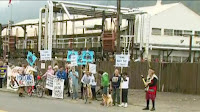Now that the world has reached a historic agreement aimed at averting the worst effects of global warming, action on climate change will increasingly happen at the municipal level, environmental advocates say.
The climate treaty by nearly 200 nations is widely viewed as an ambitious first step, but environmental campaigners and policy experts say countries will have to do much more to realize the national pledges to lower global carbon footprints and transition to renewable energy.
That's why at least 10 U.S. mayors and scores of city council members on the West Coast have pledged to stop investment in new fossil fuel infrastructure in their cities.
The mayor of Portland, Oregon, Charlie Hales, for example, recently changed his position on a proposed propane-export project at his city’s port and came out against it.
Hales traced his decision to his attendance, along with other mayors from around the world, at Pope Francis' historic climate summit at the Vatican in July, said Daphne Wysham of the Sustainable Energy & Economy Network in Portland, which works to connect citizens around the globe on climate and development issues.
"The pope kept saying, 'You world leaders need to take up the challenge of acting on climate change,'" Wysham said. "He [Hales] kept looking over his shoulder for these 'world leaders' the pope was talking about, and he finally realized it was them."
Hales took up the challenge, heeded grassroots opposition to the project over purported health and safety concerns associated with exporting propane, and in November rejected what could have been one of Portland's biggest business investments ever, Wysham said.
Read more at US Mayors Take On the Work of Slowing Climate Change

No comments:
Post a Comment